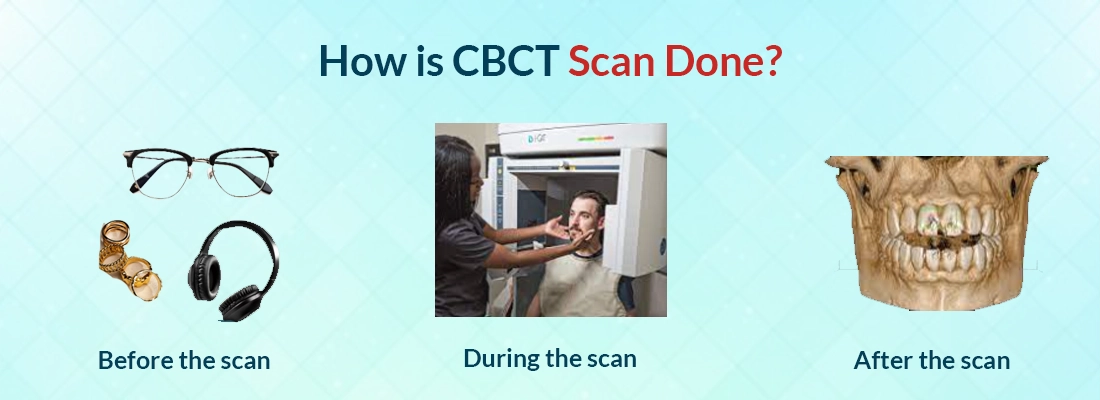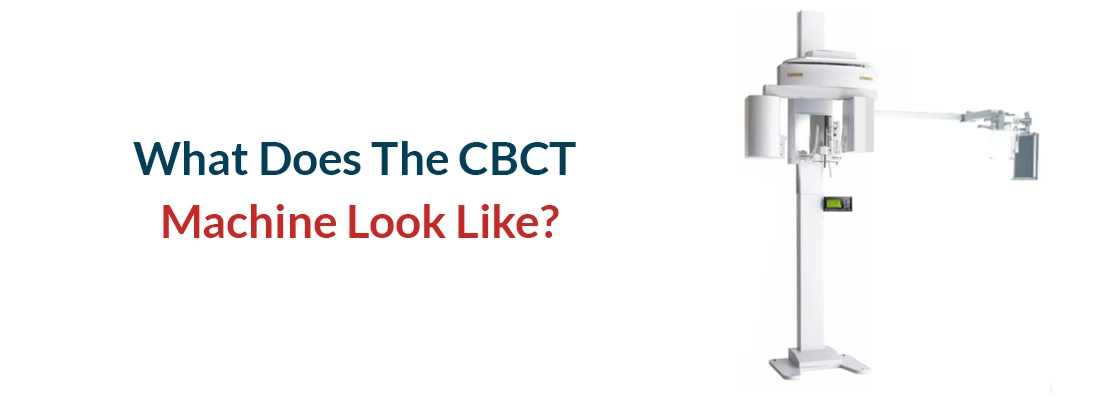
The blog contains information about the use of cone beam computed tomography particularly in the dental field. The benefits and risks of CBCT, its procedure and indication are also highlighted.
Cone-beam computed tomography (CBCT) is otherwise also known as dental CT Scan. CBCT scan is an X-Ray imaging technique in which a rotating Cone-shaped X-Ray beam is used to produce x-ray images. A CBCT scan is generally used by the dentists and ENT specialists to visualise dental structures, maxillofacial region, ears, nose and throat.
What Are the Uses of a CBCT Scan?
A CBCT Scan Machine uses a rotating cone beam x-ray system to produce CBCT Scan images of the head and neck region which represents maxilla, mandible, teeth, supporting bone, ear, nose, maxillary sinus,and other structures in its image. These images can be collaborated and modified to produce a 3D image as well. The images help your doctor to evaluate the structures and diagnose for certain conditions-
- For Detection of Pathologies- CBCT can be used to visualise and study lesions (pathologies) occurring in different parts of the head and neck region such as the maxilla, mandible, jaw, teeth, gum etc. any pathology can be precisely located with the help of the scan
- For Orthodontic Treatment Planning- a CBCT can be a helpful tool in aiding the treatment planning for orthodontic corrections. Orthodontic correction may include braces, aligners,etc. Orthodontic treatment include various phases to make a detailed treatment plan which might include-
- Cephalometric Analysis
- Reconstructive surgery planning such as BSSO surgery (bilateral sagittal split osteotomy), Lefort-1 osteotomy etc.
- Impacted teeth visualisation and removal
- Model analysis etc.
- For Detecting Sinus Conditions- sinusitis, mucositis, nasal polyps etc are some pathologies associated with sinus, which can be seen and evaluated with the help of a CBCT scan.
- For detecting Temporomandibular joint disorders (TMJ)- The origin and pain for any pathology occurring in TMJ area can be detected by CBCT scan images. CBCT can also appreciate the TMJ dislocation or TMJ subluxation. Any dislocation needs to be corrected immediately by a trained and specialist dentist.
- For Detecting Other Sinuses- Other sinuses such as nasal cavity, frontal sinus, paranasal sinuses are also examined in the CBCT.
- Dental Implant Planning- A CBCT is used for implant placement to judge the level of alveolar bone present and the surrounding structures. The analysis can help your doctor to judge if you need bone graft placement or other minor surgeries for the success of implant placement.
- Tumours and cysts analysis- a CBCT is capable of showing a tumour or any cysts which are manifesting near the tooth or other head and neck region.
How is CBCT Scan Done?

A cone beam computed tomography is a technique that produces a very high resolution image of teeth, jaw, and its surrounding structures with a cone beam x-ray system. The steps for performing a CBCT scan are-
- Before the scan - You will be asked to remove any jewellery containing your eyeglasses, earrings, noserings,any dental denture etc.before entered for the scan.
- You will be given a shield to protect other parts of your body from unnecessary exposure
- You might be given earplugs or a headset for noise protection since the machine makes clicking noise while operating.
- The machine is turned on and the projection parameters are set according to your age, height, area of interest, reason for scan etc.
- During the scan-
- You are seated in the CBCT machine
- You will need to sit still while your face rests on a small shelf in front
- There is a mouthpiece on which you will be asked to bite gently to keep your head steady during the scan
- The image quality depends very much on your stability
- The machine rotates around you to capture images while it emits low-dose radiation into you.
- The machine takes about 2-3 minutes to complete one scan.
- After the scan-
- Once the scan is complete, the raw image are then collected by the detector of the CBCT machine
- There raw files are processed to create a detailed 3D image of the teeth,jaw, and surrounding structures by the computers
- The report is collaborated and sent to your doctor for further evaluation and treatment planning.
Are OPG Scan And CBCT Scan Same?
A CBCT sectional view scan And OPG scan are different in many aspects;
- One of the most obvious differences lies in their image display function. The CBCT scan images are 3D in nature whereas the OPG X Ray images are 2-Dimensional (2D)
- The price of a CBCT scan is higher than that of the OPG price. since the CBCT machine uses superior technology.
- The receptors for a CBCT scan are capable of producing higher quality 3-dimensional images as compared to a OPG 2-dimensional images.
- The CBCT scan machine has a built-in quality to produce 2D images as an OPG can make along with its capability of producing 3D images also.
- Primarily an OPG is used for initial dental diagnosis whereas a CBCT is a more detailed view and is used for further evaluation and diagnosis of difficult to view pathologies and conditions.
What Does The CBCT Machine Look Like?

A CBCT scan machine is a square shaped machine which might include a chair on which the patient sits, the chair has a connecting arm. There is a movable table that rotates around the patient during the scan. There is an x-ray image intensifier containing an x-ray source and a detector attached to the rotating head.
How to Choose the Best CBCT Centre in Delhi?
There are several factors that justify the best diagnostic centre including its cost-effective and cost-worthy nature, its location, and the credibility of its reports.
At Ganesh diagnostic and imaging centre, we offer low cost CBCT Scans.
It is always wise to choose a diagnostic centre near your, which can offer multiple and all diagnostic scans and tests under one roof itself.
Patients can rely upon ultrasound scan reports as reports are 100% accurate.
At Ganesh Diagnostic and Imaging Centre, we are known for providing excellent service and care to its patients for decades. Lakhs of satisfied patients over the years!
Ganesh Diagnostic and Imaging Centre is a one-stop solution for getting all kinds of scan done, as all services are available under one roof.
It has been an established and renowned diagnostic centre since 2001.
Their excellence is backed by NABH and NABL Accreditations.
NABH accreditation is proof of the highest standard of care and service provided to the patients. NABL accreditation reflects the competency of laboratories and equipment based on some national and international standards.
Scan report is available digitally too.
The aim of GDIC is to provide world’s finest technology at the lowest price.
The rates of scans are reasonably priced. Ganesh Diagnostic and Imaging Centre also offers FLAT 50% OFF on CBCT scans
Get a Free Consultation From Our Doctor
- Contact Details- Dr Ravin Sharma, MBBS, MD Radiologist
- Phone number- +91 9212125996
- Availability- 24*7*36
Frequently Asked Questions
What are the risks of a CBCT scan?
The CBCT procedure is conducted under safety guidelines. It still may pose certain risks, cancer can be one of them but the risk of developing cancer due to radiation is very low. The children are more sensitive to radiation. For children the scan settings are kept on low exposure.
Who will tell me the results?
Your dentist or the doctor who ordered CBCT scan analyses the scan images and prepares a diagnosis along with the treatment plan. He then will discuss the results with you.
Is a CBCT scan painful?
A CBCT scan is a painless and quick imaging technique. You can return to doing your normal daily activities as soon as you leave the centre.
What is the cost of a CBCT scan?
A CBCT scan can range between 1000-3000 depending upon the area where you live, the availability of CBCT scanning machines, and the area of which the scan is to be conducted.
How long does it take for a CBCT scan?
One CBCT scan usually takes about 1-2 minutes to complete. It is possible that you need another scan depending upon the requirement and reason for your test.










